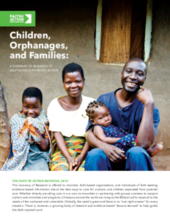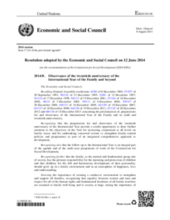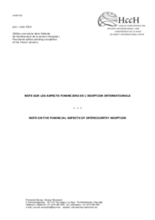Displaying 3561 - 3570 of 4420
This Summary of Research provides a concise overview of a range of studies and findings that can inform approaches to caring for children who, through orphanhood, abandonment, or other causes, have been separated from parental care.
The UN Economic and Social Council adopted a resolution on 12 June 2014 in observance of the twentieth anniversary of the International Year of the Family and beyond.
Faith to Action's latest publication, "Children, Orphanages, and Families: A Summary of Research to Help Guide Faith-Based Action" is now available online
This article describes the research underway in the Bucharest Early Intervention Project, a study that examines the impacts of neglect and deprivation on child development and wellbeing.
In this post from Community Child Protection Exchange, Sarah Lilley - Deputy Head of Child Protection, Save the Children UK and Coordinator for the Inter-Agency Learning Initiative on Community-Based Child Protection Mechanisms and Child Protection Systems - reflects on the last five years of building an evidence base on community-based child protection mechanisms.
To address the issues related to the financial aspects of intercountry adoptions, the Hague Convention initiated an Experts’ Group, which met in October 2012 and produced nine Conclusions and Recommendations, which they brought to the Permanent Bureau to publish as a “Note”.
This presentation from Innocenti’s Expert Consultation on Family and Parenting Support describes Promundo’s approach to engaging men as fathers and caregivers of children.
This presentation from Innocenti’s Expert Consultation on Family and Parenting Support discusses family separation, including the factors leading to it, global data on children’s living situations and how it relates to preventing separation.
This presentation from Innocenti’s Expert Consultation on Family and Parenting Support focuses on parenting interventions for the wellbeing of children and families in an HIV/AIDS context.
This presentation from Innocenti’s Expert Consultation on Family and Parenting Support describes Save the Children’s efforts to promote family strengthening and two case studies of family strengthening programs at work.



